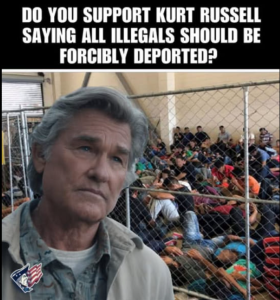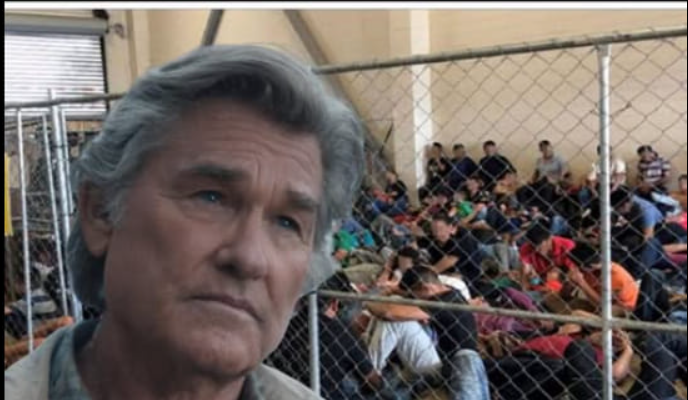
In recent days, a claim has circulated online suggesting that Kurt Russell said all undocumented immigrants should be “forcibly deported.” Before discussing the idea itself, it’s important to point out that no credible news organization or reliable source has confirmed that the actor actually made such a statement. Fact-checkers have traced the claim to unverified social media posts and misleading headlines. That means it is very likely this quote is either distorted, taken out of context, or entirely fabricated. Still, the issue it touches on—mass deportation—is real and serious, and it raises complex legal, moral, economic, and human questions.
The idea of forcibly deporting all undocumented immigrants might sound straightforward to some people, but in practice it would be a deeply complicated and damaging policy. Forcible mass deportation goes far beyond immigration enforcement as it currently exists. It would involve arresting and removing millions of people, many of whom have lived in their communities for years or even decades. Some have children who are citizens. Others are asylum seekers or victims of trafficking. A large number work legally in industries that rely on immigrant labor, even if their status is technically irregular. Carrying out such a plan would have massive consequences—not only for the people being deported, but for the entire country.
One of the most fundamental problems with blanket deportation is that it conflicts with due process. In the United States, immigration enforcement is bound by law. Even non-citizens have certain rights under the Constitution. That means they must have the opportunity to make their case before an immigration judge, to seek asylum, or to contest their removal if they have legal grounds to stay. A plan to remove everyone without hearings would run into immediate legal challenges, because it would violate these established protections. Mass sweeps without individualized hearings would likely be found unconstitutional in U.S. courts.
Beyond legality, there are serious humanitarian concerns. Many undocumented immigrants are not just faceless statistics. They are individuals with families, jobs, homes, and deep ties to their communities. Some fled violence or persecution in their home countries. Others came as children and have known no other country as home. Forcibly deporting them would mean separating parents from their children, uprooting people who have built lives for years, and returning some to dangerous or unstable situations. This kind of approach disregards the human cost behind the headlines.
There are also major practical obstacles. Deporting millions of people is not as simple as putting them on a plane or bus. It would require locating, arresting, detaining, and processing each individual. That means tens of thousands of additional immigration agents, expanded detention facilities, and massive transportation operations. All of this would cost an enormous amount of taxpayer money. Estimates from previous policy discussions suggest that attempting to remove the entire undocumented population would cost hundreds of billions of dollars and take years to complete. Meanwhile, the disruption to communities and workplaces would be immediate.
The economic consequences of such a policy would also be severe. Undocumented immigrants make up a significant portion of the labor force in industries such as agriculture, construction, hospitality, and caregiving. If all these workers were suddenly removed, businesses would face severe labor shortages. Food production could be disrupted, construction projects could stall, and service industries could suffer. Consumers would likely see price increases, and some businesses could shut down entirely. Economists from across the political spectrum have warned that mass deportation would shrink the workforce and harm the broader economy.
Social consequences cannot be ignored either. Large-scale deportation programs can erode trust between immigrant communities and law enforcement. If people fear that any interaction with police might lead to deportation, they become less likely to report crimes, cooperate as witnesses, or seek help when needed. This can make communities less safe for everyone. It can also drive people deeper underground, making it harder for public health campaigns and social services to reach them. Fear-based policies can lead to isolation, mistrust, and lasting damage to the social fabric.
None of this means that immigration enforcement should not exist. Countries have the right to manage their borders and enforce their laws. But enforcement has to be done in a way that is lawful, proportionate, and focused on real threats rather than indiscriminate sweeps. In practice, immigration authorities already prioritize certain cases for removal—such as individuals with serious criminal records or repeated violations. That kind of targeted approach is more practical, more humane, and more legally sound than blanket deportation.
There are also broader policy solutions that can address concerns about irregular migration more effectively than force alone. One is modernizing the legal immigration system so that people who want to come for work or family reasons can do so through legal channels. Another is improving the asylum system so that claims can be processed quickly and fairly, reducing backlogs that encourage irregular entry. Addressing root causes in countries of origin—such as violence, poverty, and lack of opportunity—can also reduce pressure at the border over time.
Another serious consideration is the impact on families. Many undocumented immigrants are part of mixed-status families, meaning that some members are citizens or legal residents while others are not. Forcibly deporting parents of U.S. citizen children would leave thousands of kids without their primary caregivers. These children could end up in foster care or face emotional and financial hardships. Mass deportation doesn’t just affect the people being removed; it affects entire families and communities.
History offers some cautionary lessons as well. In previous eras, large-scale immigration raids or deportation campaigns have often led to civil rights violations, mistaken arrests, and the targeting of people who were legally present. Sweeping policies tend to produce blunt results. They do not allow for the individual circumstances that real justice requires. In the end, they often create more problems than they solve.
Ethically, a policy of forcibly deporting millions of people raises questions about what kind of society we want to be. Democratic societies are built on respect for human dignity and the rule of law. This doesn’t mean ignoring immigration laws. It does mean enforcing them with fairness and proportionality. A policy that relies on force as the first and only solution undermines those values. It treats entire groups as a problem to be removed, rather than human beings with rights and stories.
Politically, sweeping mass deportation proposals often generate more division than consensus. Immigration is already one of the most polarizing issues in many countries. A policy that promises to remove millions of people would likely face enormous opposition, legal barriers, and logistical hurdles. It may sound simple in a soundbite, but the reality is far more complex. Real immigration reform requires careful planning, compromise, and long-term strategies, not slogans.
It is also important to distinguish between rhetoric and actual policy. Politicians and public figures may make strong statements to appeal to emotions or political bases. But turning those statements into action requires real-world plans that can withstand legal scrutiny and practical challenges. So even if a celebrity or politician claims that all undocumented immigrants should be deported, that does not make it a realistic or responsible course of action.
In short, the claim attributed to Kurt Russell is almost certainly false, and even if someone had made such a statement, the idea itself would be unwise. Forcibly deporting all undocumented immigrants would be legally questionable, economically harmful, socially destabilizing, and morally troubling. A more balanced approach is needed—one that enforces the law while respecting human rights, focuses on serious offenders rather than entire communities, and modernizes immigration systems to reflect reality. Real solutions come from thoughtful policy, not from fear or slogans.

